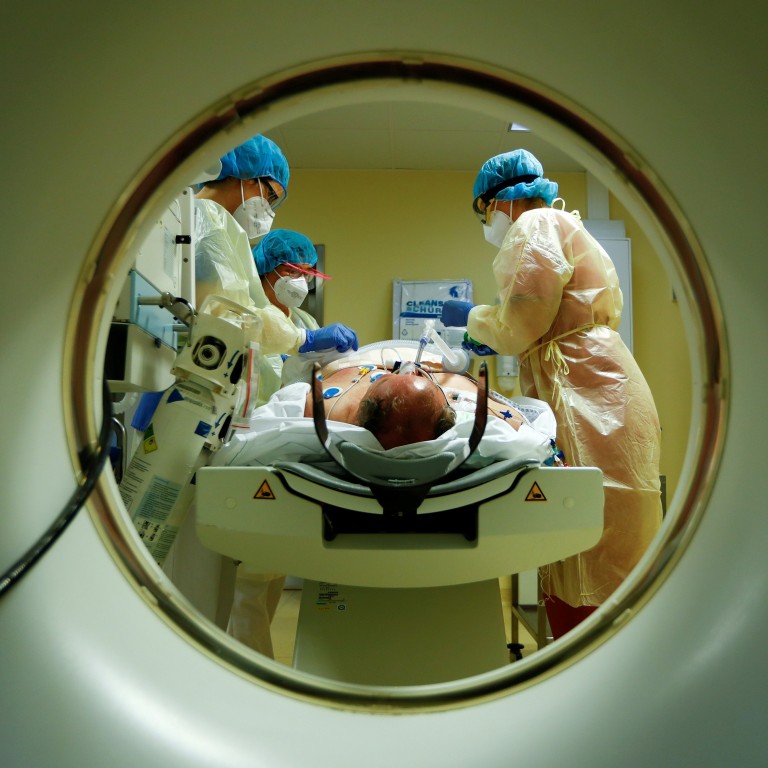
Coronavirus: US hits 9 million cases, as hospitals face increased pressure in North America, Europe
- The US, which has seen a resurgence of its outbreak since mid-October, has now notched up more than 9.03 million cases
- Surging Covid-19 cases are filling intensive-care beds, straining hospitals and prompting some to warn of critical shortages across North America and Europe
Global cases surpassed 45 million, with the death toll at almost 1.2 million. Italy and Greece reported infection records, piling pressure on their governments to follow Germany and France in further tightening restrictions on public life.
Coronavirus ‘hitching a ride on food’, says Singapore scientist
In the US, Texas has the most hospitalised Covid-19 patients, with almost 6,000 cases filling 10 per cent of occupied beds, data updated on Friday from the Department of Health and Human Services showed.
Hospitalisations also skyrocketed in more than a dozen countries in Europe, with admissions soaring beyond the peak reached last spring in a swathe from Austria to Portugal.

03:07
France aiming for ‘brutal brake on infections’ with its second national lockdown to fight Covid-19
France, Germany and Belgium will clamp down on movement for at least a month, approaching the stringent lockdowns in the spring as Europe seeks to regain control of the crisis.
France reported 49,215 new cases on Friday, more than six times the level a month ago. The government plans to spend an additional 2.5 billion euros (US$2.9 billion) preparing hospitals for the disease, which President Emmanuel Macron said may cause 9,000 patients to fall critically ill by mid-November.
Duterte keen to strike Covid-19 vaccine deal with Chinese government
Admissions to French intensive care units have been steadily rising since the beginning of September, reaching 3,156 as of Thursday. Macron warned the number could reach 9,000 in two weeks. Belgium and Switzerland predicted hospitals may reach capacity in a week or two.
“There’s a certain sense of foreboding when you see community transmission reach high levels,” said Stephen Warrillow, an intensive care doctor in Melbourne and former president of the Australian and New Zealand Intensive Care Society. A surge in cases typically means intensive-care admissions will increase 10 to 14 days later, he said.
In Germany, the number of Covid-19 patients requiring intensive care more than doubled in the past two weeks to 1,696 as of Thursday, with about half on ventilators, according to the country’s public-health institute. About three quarters of Germany’s more than 29,000 intensive-care beds are occupied.
The Czech Republic faces a similar staffing shortage even after directing the army to build a field hospital in Prague, prompting the eastern European country to move to coordinating care on a national level.
“Even though we still have sufficient bed capacities, we are starting to lack qualified staff,” Health Minister Jan Blatny told the parliament in Prague on Friday. “Some regions are at the edge of being exhausted.”
The Polish government on Friday said its health system was “stretched to its limits”. Prime Minister Mateusz Morawiecki asked its biggest state-run companies to build temporary hospitals to add more than 3,000 beds.
Northern Ireland has surge capacity of ICU beds available, the region’s health minister Robin Swann said on Wednesday, even as the number of severe Covid-19 patients hovers close to the highest since May. There are 19 ICU beds available currently, while 99 per cent of hospital beds overall in the region are occupied, according to health ministry statistics.
The situation in Nordic countries was less dire. Sweden on Friday said coronavirus patients were occupying 57 of its 525 intensive-care beds. The Armed Forces, including mobile field hospitals, will be called in if needed.
South Korea scrambles to control panic after flu vaccine deaths
“We are entering the part of the curve with very high contagion levels and may potentially reach the limits of what the health care system and what society can handle,” Anders Tegnell, Sweden’s state epidemiologist, said at a briefing in Stockholm on Thursday.
In Canada, the ICU at Winnipeg’s St. Boniface Hospital was exceeding capacity due to the surge in Covid-19 patients, CBC reported, citing a memo sent to hospital staff late on Thursday.
Canadian health authorities on Friday urged people to cut the number of personal contacts they had with others to tackle a second virus wave. Prime Minister Justin Trudeau said more targeted measures could help avert another major national shutdown of the kind that hammered the economy earlier in the year.
Additional reporting by AFP, Reuters


